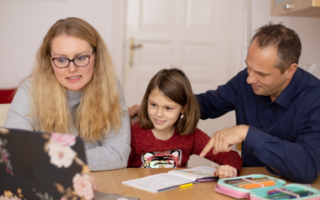33 Essential Things to Teach Your 2-Year-Old.
As parents and caregivers, we are tasked with one of the most important jobs in the world: raising the next generation. The toddler years, especially around the age of two, are a magical and transformative time.
It’s a period when children develop rapidly, and their personalities begin to shine through. Teaching your 2-year-old essential skills lays the foundation for their emotional, physical, and cognitive development. But what are the key things you should be focusing on during this stage?
In this guide, we’ll walk through 33 essential things to teach your 2-year-old to help them thrive. From language development to emotional intelligence and basic social skills, we will cover practical tips, fun activities, and developmental milestones that will set your toddler on the path to becoming a confident and well-rounded individual.
33 ESSENTIAL THINGS TO TEACH YOUR 2-YEAR-OLD
WHY TEACHING YOUR 2-YEAR-OLD IS CRUCIAL
The first few years of life are critical for a child’s overall growth. At the age of two, children experience significant developments in their motor skills, language abilities, and social interactions.
According to child development experts, this is the perfect time to introduce your child to new concepts, help them build important life skills, and encourage their natural curiosity.
By focusing on essential things to teach your 2-year-old, you not only help them meet developmental milestones but also create a strong bond with them as they begin to explore the world around them.
These years are formative, and your involvement will significantly impact their emotional intelligence, cognitive abilities, and social skills in the years to come.
33 ESSENTIAL THINGS TO TEACH YOUR 2-YEAR-OLD
1. BUILDING LANGUAGE SKILLS
At two years old, children are like sponges, absorbing new words and sounds every day. This is the perfect time to start building your toddler’s vocabulary and encourage them to communicate with others.
PRACTICAL TIPS:
-
Read to Them Regularly:
Reading books together is one of the best ways to enhance language skills. Choose colorful picture books with simple words and rhymes.
-
Expand Their Sentences:
If your child says “car,” you can respond by saying, “Yes, that’s a red car.” Expanding on their words helps them learn new vocabulary.
-
Encourage Imitation:
Toddlers learn by imitating adults, so use clear speech and avoid baby talk.
2. TEACHING BASIC MANNERS
Good manners are something you can begin teaching early. By the time they are two, toddlers can start learning how to say “please” and “thank you.” These small gestures form the foundation of their social interactions and teach them how to respect others.
PRACTICAL TIPS:
-
Model the Behavior:
Use polite phrases in everyday conversation and encourage them to repeat after you.
-
Positive Reinforcement:
Praise your child when they use manners on their own, such as saying “please” when asking for something.
3. RECOGNIZING COLORS AND SHAPES
Recognizing colors and shapes is one of the early learning milestones for toddlers. These basic concepts help your child begin to understand the world around them in a more structured way.
PRACTICAL TIPS:
-
Use Toys and Objects:
Use colorful toys or everyday objects to help teach colors and shapes. For example, play with building blocks or sort items by color.
-
Sing Songs:
Singing songs about colors and shapes can be a fun and interactive way to reinforce learning.
4. UNDERSTANDING NUMBERS AND COUNTING
Introducing numbers and basic counting helps toddlers develop their early math skills.
While they may not fully understand numbers at this stage, learning to count in a playful and engaging way is important for their cognitive development.
PRACTICAL TIPS:
-
Count Everyday Items:
Count objects as you interact with them, like stacking blocks or placing snacks on a plate.
-
Use Songs and Rhymes:
Sing counting songs, such as “One, Two, Buckle My Shoe,” to reinforce number recognition.
5. TEACHING THE IMPORTANCE OF SHARING
Sharing is a valuable social skill that is essential for positive interactions with others.
At two years old, your child will likely begin to understand the concept of sharing but may still struggle with it. Patience and gentle guidance are key.
PRACTICAL TIPS:
-
Model Sharing:
Let your child see you share with others. For instance, “I’m going to share my book with you.”
-
Praise Sharing:
When your child shares a toy or snack with another child, offer positive reinforcement.
6. ENCOURAGING PROBLEM-SOLVING SKILLS
At two, children are curious and eager to explore. Encouraging them to solve simple problems independently helps develop their cognitive skills.
This could involve tasks like solving puzzles or figuring out how to open a toy.
PRACTICAL TIPS:
-
Provide Age-Appropriate Puzzles:
Choose puzzles with large pieces and simple designs to help your toddler learn how to solve them.
-
ASK QUESTIONS:
Guide them by asking questions like, “How do you think we can fit the pieces together?”
7. TEACHING EMOTIONAL EXPRESSION
Two-year-olds are learning how to express their emotions in healthy ways. Teaching them to recognize and name their feelings can foster emotional intelligence and help them handle their emotions as they grow.
PRACTICAL TIPS:
-
USE EMOTION CARDS:
Show your child emotion cards with faces representing different feelings. Help them identify emotions such as happy, sad, and angry.
-
VALIDATE THEIR EMOTIONS:
When your toddler is upset, acknowledge their feelings and reassure them. For example, “I see you’re upset. It’s okay to feel sad.”
8. LEARNING TO FOLLOW SIMPLE INSTRUCTIONS
By age two, your child is starting to understand and follow basic instructions.
This is an essential skill for daily routines and learning how to engage in structured activities.
PRACTICAL TIPS:
-
Use Clear, Simple Instructions:
Keep your instructions short and direct, such as “Put the toy in the box.”
-
Offer Praise:
When your toddler follows instructions, praise them with affirmations like, “Good job!”
9. POTTY TRAINING BASICS
Though every child is different, many parents begin potty training around the age of two. At this age, toddlers are often ready to start learning the basics of using the toilet.
PRACTICAL TIPS:
-
INTRODUCE THE CONCEPT:
Start by talking about the potty and showing them how it works.
-
BE PATIENT:
Don’t rush the process. If your toddler isn’t ready, it’s okay to wait and try again later.
10. ESTABLISHING A ROUTINE
Children thrive on routine and predictability. A consistent daily schedule helps them feel secure and manage transitions from one activity to another.
PRACTICAL TIPS:
-
CREATE A VISUAL SCHEDULE:
Use pictures to represent the various activities in their day, such as eating, napping, and playtime.
-
STICK TO CONSISTENT TIMING:
Try to keep meals, naps, and bedtime at the same time each day to build a reliable routine.
11. LEARNING TO DRESS THEMSELVES
At two, many children start showing an interest in dressing themselves. Encouraging this independence not only boosts their confidence but also enhances their fine motor skills.
PRACTICAL TIPS:
-
Start with Simple Clothing:
Choose clothes that are easy to put on and take off, such as elastic waistbands or shirts with big armholes.
-
Encourage Self-Dressing:
Give them time to try on their own, but be ready to help when needed.
-
Celebrate Efforts:
Praise their attempts, even if the outfit isn’t perfectly put together.
12. RECOGNIZING THEIR NAME
Recognizing their own name is an important early milestone that helps toddlers understand identity and personal connection.
PRACTICAL TIPS:
-
Use Their Name Often:
Say their name regularly when talking to them, like “Oma, can you help me with this?”
-
Show Name Recognition in Books:
Include personalized books where their name appears frequently, so they start associating it with themselves.
13. USING THE WORDS “SORRY” AND “EXCUSE ME”
Teaching basic manners like “sorry” and “excuse me” at an early age helps your toddler learn the importance of politeness and respecting others.
PRACTICAL TIPS:
-
Model the Phrases:
Use these phrases in everyday situations, such as when they accidentally bump into someone.
-
Practice with Playmates:
Encourage your child to say “excuse me” when they need attention or “sorry” when they hurt someone.
14. UNDERSTANDING THE CONCEPT OF “CLEAN UP”
At two, your child is capable of understanding the basic idea of cleaning up after themselves.
This simple life skill helps foster responsibility and organizational habits.
PRACTICAL TIPS:
-
Make it Fun:
Turn cleaning up into a game by singing a song or setting a timer for a “clean-up race.”
-
Be Consistent:
Have a set routine for cleaning up at the end of playtime or after meals.
15. LEARNING TO WAIT THEIR TURN
Sharing and waiting their turn is a crucial social skill that can be difficult for toddlers to grasp.
Teaching them patience in small doses will help with future interactions.
PRACTICAL TIPS:
-
Take Turns During Playtime:
Practice turn-taking during activities like playing with toys, games, or even using the TV remote.
-
Offer Praise:
Reinforce waiting patiently with positive feedback, like “Good job waiting your turn.”
16. SINGING NURSERY RHYMES
Nursery rhymes are an excellent way for toddlers to develop language and memory skills. Plus, they are fun and interactive!
PRACTICAL TIPS:
-
Sing Together:
Encourage your child to sing along with you, using hand motions or props to make the experience more engaging.
-
Repeat Favorite Rhymes:
Repetition helps toddlers memorize the lyrics and develop confidence in their singing abilities.
17. DEVELOPING FINE MOTOR SKILLS
Fine motor skills are crucial for tasks like holding a pencil, eating with utensils, and buttoning clothes. At two, toddlers are refining these abilities.
PRACTICAL TIPS:
-
Provide Sensory Play:
Play with playdough, stacking blocks, or puzzles to strengthen hand-eye coordination.
-
Encourage Drawing:
Provide crayons or markers for your child to practice scribbling, which helps improve their grip.
18. RECOGNIZING ANIMALS AND THEIR SOUNDS
Learning about animals and the sounds they make is not only fun but also helps children expand their vocabulary.
PRACTICAL TIPS:
-
Animal Books:
Read books with colorful pictures of animals and say their names and corresponding sounds aloud.
-
Visit a Zoo or Farm:
If possible, take your child to a zoo or petting farm where they can see animals in real life.
19. LEARNING THE ALPHABET (LETTER RECOGNITION)
While full literacy is still a ways off, recognizing letters is a foundational skill for future reading.
PRACTICAL TIPS:
-
Alphabet Songs:
Sing the ABC song together to help them get familiar with the letter sequence.
-
Letter Toys:
Use toys, puzzles, or books that focus on letter recognition.
20. EXPLORING BASIC HOUSEHOLD CHORES
Engaging in simple chores like picking up toys or putting dishes away can help your toddler develop a sense of responsibility.
PRACTICAL TIPS:
-
Create Small Tasks:
Have your child help with easy tasks, like putting dirty clothes in the laundry basket or wiping down surfaces.
-
Make it a Routine:
Incorporate these chores into their daily routine, making them part of family life.
21. UNDERSTANDING THE CONCEPT OF “BIG” AND “SMALL”
Learning the concept of size is an important part of a toddler’s cognitive development.
PRACTICAL TIPS:
-
Use Everyday Objects:
Point out big and small objects around the house, like comparing a big ball to a small one.
-
Sort Objects by Size:
Use toys or objects to sort by size, asking your child which ones are big and which are small.
22. UNDERSTANDING PERSONAL SPACE
Teaching your toddler the importance of personal space and boundaries is essential for their future social interactions.
PRACTICAL TIPS:
-
Model Boundaries:
Teach your child to respect others’ personal space by modeling it yourself.
-
Use Visuals:
Set up visual cues, like saying “step back” when someone is too close, to reinforce the idea of personal space.
23. DEVELOPING HAND-EYE COORDINATION
Hand-eye coordination is essential for tasks like catching a ball, drawing, and feeding themselves. At two, your toddler is refining these skills.
PRACTICAL TIPS:
-
Play Catch:
Practice throwing and catching a soft ball to help develop hand-eye coordination.
-
Drawing Activities:
Encourage them to draw shapes and lines to improve their coordination.
24. PRACTICING SIMPLE HYGIENE ROUTINES
Teaching good hygiene habits early on helps toddlers develop the foundation for personal care and cleanliness.
PRACTICAL TIPS:
-
Hand washing:
Make hand washing fun by singing a song and demonstrating the steps.
-
Brushing Teeth:
Introduce a small toothbrush and show them how to brush their teeth.
25. EXPLORING CREATIVE PLAY (ART AND MUSIC)
Encouraging creative play helps toddlers express themselves and enhances their cognitive and emotional development.
PRACTICAL TIPS:
-
Introduce Art Supplies:
Give your child crayons, markers, or finger paints to create their own art.
-
Sing and Dance:
Play music and encourage them to sing and dance, promoting creativity and physical movement.
26. LEARNING TO HANDLE DISAPPOINTMENT
Helping your toddler learn to cope with disappointment is an important emotional skill.
PRACTICAL TIPS:
-
Model Coping Strategies:
Show them how to express frustration calmly, saying “I’m upset, but it’s okay.”
-
Praise Resilience:
When your child copes well with disappointment, praise them for their patience.
33 ESSENTIAL THINGS TO TEACH YOUR 2-YEAR-OLD
27. RECOGNIZING FAMILY MEMBERS BY NAME
At two, children start to understand relationships with family members. Teaching them to recognize names and roles strengthens their sense of belonging.
PRACTICAL TIPS:
-
Introduce Family Names:
Use family photos to help them associate names with faces, saying “This is Daddy” or “This is Grandma.”
-
Talk About Relationships:
Explain who is who in relation to them (e.g., “Mommy is your mommy”).
28. LEARNING TO USE UTENSILS
Learning to eat with utensils is an important milestone. Though it may get messy at first, it’s a skill your toddler will need as they grow.
PRACTICAL TIPS:
-
Give Child-Friendly Utensils:
Use toddler-sized forks and spoons to help them practice eating with utensils.
-
Model the Behavior:
Eat with utensils in front of your toddler so they can imitate your actions.
29. BUILDING SIMPLE CONNECTIONS BETWEEN OBJECTS
At two, your child begins making simple associations between objects, such as understanding that a cup is for drinking.
PRACTICAL TIPS:
-
Introduce Matching Games:
Use toys or household items to help your child match similar objects, like matching socks or stacking cups.
-
Use Everyday Examples:
Point out connections in everyday life, such as “The spoon goes with the bowl.”
30. UNDERSTANDING THE CONCEPT OF “NO”
At this age, toddlers are learning to navigate boundaries, and “no” is an important word for them to understand.
PRACTICAL TIPS:
-
Use Positive Language:
Instead of just saying “no,” offer alternatives like “No, we can’t touch that, but you can play with this toy.”
-
Consistency is Key:
Be consistent in enforcing boundaries to help your child understand expectations.
31. RECOGNIZING THEIR OWN REFLECTION
At two, toddlers start becoming more self-aware and can recognize themselves in mirrors or photos.
PRACTICAL TIPS:
-
Use Mirrors:
Show them their reflection and say, “Look, it’s you!”
-
Talk About Their Features:
Point out different parts of their face, like “This is your nose!”
32. SAYING GOODBYE AND HELLO POLITELY
Teaching toddlers to say “goodbye” and “hello” is important for developing social skills.
PRACTICAL TIPS:
Model Politeness: Always say “hello” and “goodbye” yourself, and encourage your child to imitate you
33. LEARNING TO IDENTIFY EMOTIONS
At this age, toddlers are just beginning to understand their own emotions and those of others.
Teaching them to recognize and name feelings helps build emotional intelligence.
PRACTICAL TIPS:
Talk About Emotions: Name the emotions they might feel, such as “happy,” “sad,” or “angry,” and relate them to everyday situations.
For example, “You look happy when we play with your toys” or “It’s okay to be sad when you lose your favorite teddy bear.”
-
Use Picture Books:
There are many picture books that show characters experiencing different emotions, helping toddlers connect faces with feelings.
-
Encourage Expression:
When they’re upset or frustrated, encourage your toddler to express what they’re feeling.
For example, “Can you show me your mad face?” or “How does your happy face look?”
Teaching a 2-year-old may seem challenging, but these early years are a time of tremendous growth and learning. By providing your toddler with the tools and opportunities to develop foundational skills like social awareness, communication, emotional understanding, and basic independence, you are setting them up for future success.
The 33 essential things to teach your 2-year-old form the building blocks of a well-rounded and self-confident child. Incorporating simple routines, constant encouragement, and plenty of patience can help these lessons stick in their minds.
Remember, every child develops at their own pace, so don’t stress if they don’t master everything immediately. Celebrate their achievements, no matter how small, and be ready to guide them through any challenges they may encounter along the way.
By teaching these skills now, you are laying the foundation for a lifetime of learning and growth. So enjoy these moments, knowing that every lesson is contributing to the amazing individual your child is becoming.
Parents and caregivers play a huge role in shaping a child’s early development. The skills and knowledge you teach your 2-year-old will not only benefit them in their immediate environment but also equip them for years to come. Start with the basics, keep it fun, and let your toddler lead the way in their own learning journey!




